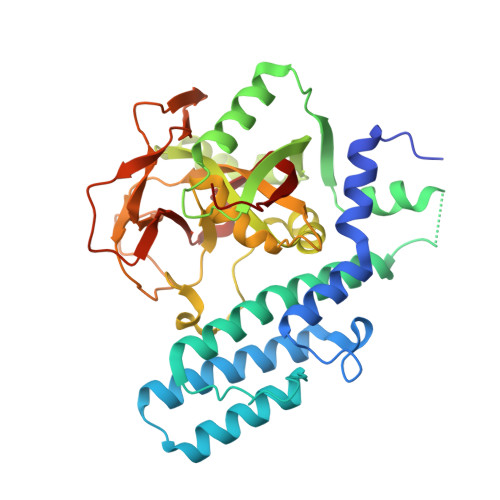Discovery of 2-[1-(4,4-Difluorocyclohexyl)Piperidin-4-Yl]-6-Fluoro-3-Oxo-2,3-Dihydro-1H-Isoindole-4-Carboxamide (Nms-P118): A Potent, Orally Available and Highly Selective Parp- 1 Inhibitor for Cancer Therapy.
Papeo, G.M.E., Posteri, H., Borghi, D., Busel, A.A., Caprera, F., Casale, E., Ciomei, M., Cirla, A., Corti, E., D'Anello, M., Fasolini, M., Forte, B., Galvani, A., Isacchi, A., Khvat, A., Krasavin, M.Y., Lupi, R., Orsini, P., Perego, R., Pesenti, E., Pezzetta, D., Rainoldi, S., Riccardi-Sirtori, F., Scolaro, A., Sola, F., Zuccotto, F., Felder, E.R., Donati, D., Montagnoli, A.(2015) J Med Chem 58: 6875
- PubMed: 26222319
- DOI: https://doi.org/10.1021/acs.jmedchem.5b00680
- Primary Citation of Related Structures:
4ZZX, 4ZZY, 4ZZZ, 5A00 - PubMed Abstract:
The nuclear protein poly(ADP-ribose) polymerase-1 (PARP-1) has a well-established role in the signaling and repair of DNA and is a prominent target in oncology, as testified by the number of candidates in clinical testing that unselectively target both PARP-1 and its closest isoform PARP-2. The goal of our program was to find a PARP-1 selective inhibitor that would potentially mitigate toxicities arising from cross-inhibition of PARP-2. Thus, an HTS campaign on the proprietary Nerviano Medical Sciences (NMS) chemical collection, followed by SAR optimization, allowed us to discover 2-[1-(4,4-difluorocyclohexyl)piperidin-4-yl]-6-fluoro-3-oxo-2,3-dihydro-1H-isoindole-4-carboxamide (NMS-P118, 20by). NMS-P118 proved to be a potent, orally available, and highly selective PARP-1 inhibitor endowed with excellent ADME and pharmacokinetic profiles and high efficacy in vivo both as a single agent and in combination with Temozolomide in MDA-MB-436 and Capan-1 xenograft models, respectively. Cocrystal structures of 20by with both PARP-1 and PARP-2 catalytic domain proteins allowed rationalization of the observed selectivity.
Organizational Affiliation:
Oncology, Nerviano Medical Sciences Srl , Viale Pasteur 10, 20014 Nerviano, Milan, Italy.

















